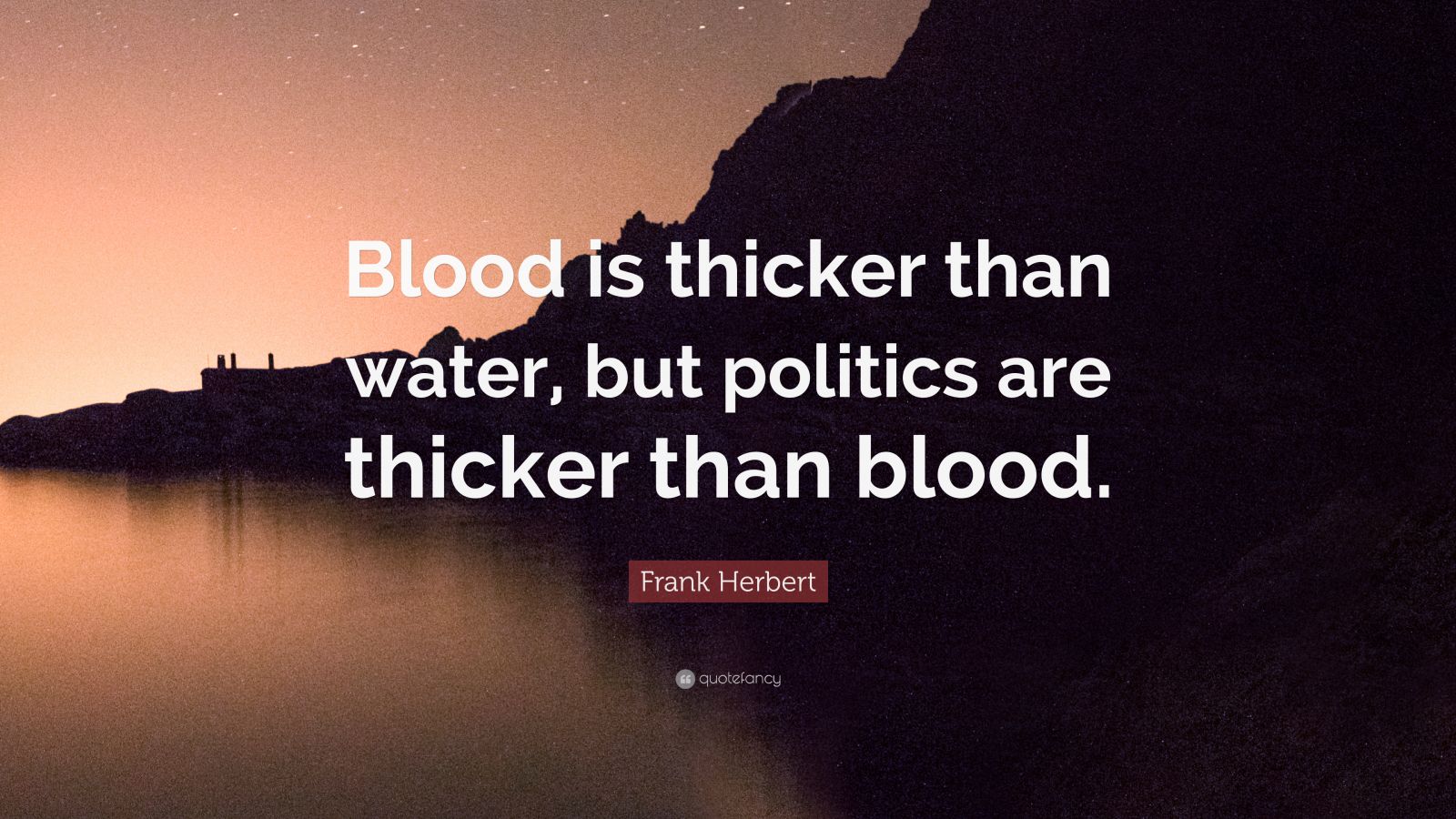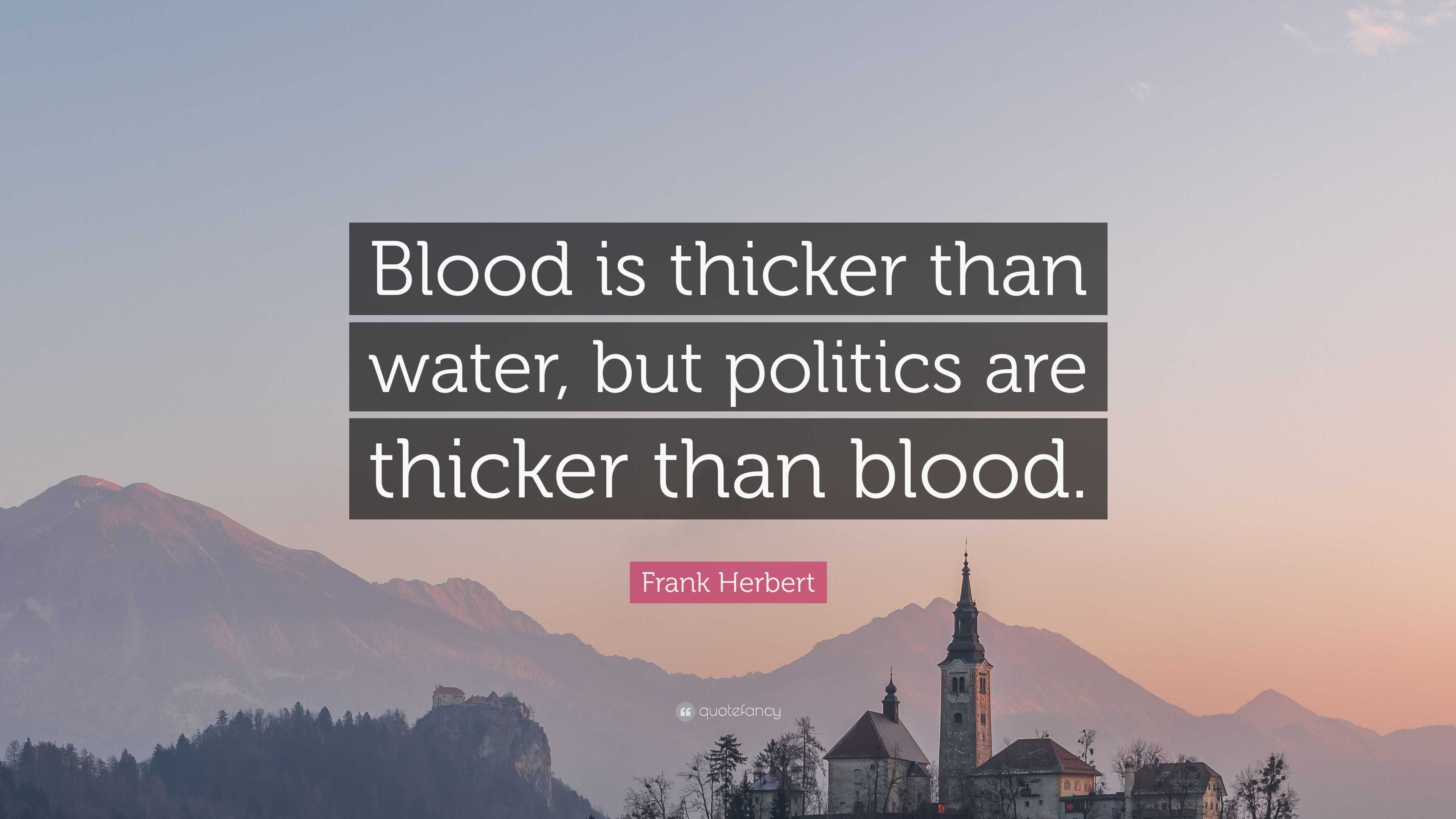Full Quote "Blood Is Thicker Than Water": Meaning, History, And Interpretations
“Blood is thicker than water” is a widely recognized phrase that carries deep historical and cultural significance. This saying suggests that family bonds are stronger than any other relationships. However, the true meaning and origin of the phrase go beyond its surface-level interpretation. In this article, we will explore the full quote, its historical roots, and how it has evolved over time.
The phrase "blood is thicker than water" has been used for centuries, but its origins may surprise you. While many people believe it emphasizes the importance of family loyalty, its original meaning was quite different. Understanding the full context of this quote can help us appreciate the complexity of familial relationships and the values they represent.
As we delve deeper into this topic, you will discover fascinating insights into the origins, interpretations, and cultural implications of the phrase. Whether you're exploring its historical background or seeking modern applications, this article will provide you with comprehensive information to enhance your understanding.
Read also:Drake And New Girlfriend Exploring The Relationship And Unveiling The Truth
Table of Contents
- The History of "Blood is Thicker Than Water"
- The Original Meaning of the Phrase
- How the Phrase Evolved Over Time
- Modern Interpretation of the Quote
- Cultural Significance of the Saying
- Impact on Family Relationships
- References in Literature and Media
- Common Misconceptions About the Phrase
- Variations and Similar Expressions
- Conclusion and Final Thoughts
The History of "Blood is Thicker Than Water"
The phrase "blood is thicker than water" dates back centuries and has a rich historical background. While its modern interpretation emphasizes the importance of family ties, the original meaning was quite different. Historically, the phrase was used to signify the bonds formed through shared experiences, such as in military or tribal contexts, rather than biological relationships.
Tracing its origins, the saying can be attributed to early Germanic and Middle English texts. In the 12th century, the phrase "blod is thicker than water" appeared in a German proverb, which highlighted the significance of loyalty among comrades-in-arms. Over time, the meaning shifted to focus more on family ties, reflecting societal changes and evolving values.
Historical Context of the Phrase
The historical context of "blood is thicker than water" reveals how cultural shifts influenced its meaning. During the medieval period, the phrase was often used in the context of feudal systems, where loyalty to one's lord or clan was paramount. As societies became more focused on nuclear families, the phrase gradually came to represent familial bonds.
- 12th Century: Used to describe bonds between warriors.
- 16th Century: Transitioned to emphasize family loyalty.
- Modern Era: Commonly interpreted as prioritizing family over outsiders.
The Original Meaning of the Phrase
Contrary to popular belief, the original meaning of "blood is thicker than water" did not emphasize family bonds. Instead, it referred to the deep connections formed through shared experiences, such as those between soldiers or comrades. These relationships were often considered stronger than mere biological ties.
Early Usage in Literature
One of the earliest recorded uses of the phrase can be found in John Ray's "A Collection of English Proverbs" published in 1670. In this work, Ray explained the phrase as referring to the bonds of friendship and loyalty rather than familial ties. This interpretation reflects the cultural values of the time, where loyalty to one's community or group was highly valued.
According to Ray, the phrase symbolized the idea that "the blood of the covenant is thicker than the water of the womb," emphasizing the importance of covenantal relationships over biological ones. This interpretation highlights the complexity of the phrase and its evolving meaning over time.
Read also:Unveiling The Stellar Cast Of Two And A Half Men A Comprehensive Look At The Actors
How the Phrase Evolved Over Time
As societies evolved, so did the interpretation of "blood is thicker than water." The shift from emphasizing loyalty among comrades to prioritizing family relationships reflects broader changes in social structures and values. In the 19th century, the phrase began to take on its modern connotation, focusing on the strength of family bonds.
Factors Influencing the Evolution
- Industrial Revolution: Shifted focus to nuclear families.
- Victorian Era: Emphasis on family values and domesticity.
- 20th Century: Popularization in media and literature.
These factors contributed to the modern understanding of the phrase, where family loyalty is seen as paramount. However, it is important to recognize the historical context and the original meaning to fully appreciate its significance.
Modern Interpretation of the Quote
In contemporary society, "blood is thicker than water" is commonly understood as a reminder of the importance of family loyalty. This interpretation is reflected in various aspects of modern life, including literature, media, and everyday conversations. However, the phrase is not without controversy, as some argue that it can perpetuate unhealthy familial dynamics.
Applications in Modern Culture
Modern interpretations of the phrase can be seen in various forms of media, including films, television shows, and literature. For example, the saying is often used to highlight the sacrifices individuals make for their families or to emphasize the importance of staying loyal to one's roots. However, it is also important to recognize that not all family relationships are positive or healthy, and the phrase should be approached with nuance.
Cultural Significance of the Saying
The cultural significance of "blood is thicker than water" extends beyond its literal meaning. In many cultures, family is considered the foundation of society, and the phrase reflects this value. However, the interpretation of the saying can vary depending on cultural context, highlighting the diversity of familial relationships across the globe.
Global Perspectives on Family Loyalty
While the phrase is widely recognized in Western cultures, its meaning may differ in other parts of the world. For example, in collectivist societies, family loyalty is often seen as an integral part of social harmony. In contrast, individualist cultures may prioritize personal autonomy over familial obligations. Understanding these cultural differences can help us appreciate the complexity of the phrase and its global significance.
Impact on Family Relationships
The phrase "blood is thicker than water" has a profound impact on how we view family relationships. While it emphasizes the importance of family loyalty, it can also perpetuate negative dynamics, such as enabling toxic relationships or discouraging individuals from pursuing personal growth. Striking a balance between loyalty and self-care is essential for maintaining healthy family relationships.
Challenges in Modern Family Dynamics
- Managing expectations in blended families.
- Navigating generational differences.
- Addressing unhealthy family dynamics.
By recognizing the complexities of family relationships, we can use the phrase as a guide for fostering positive connections while also prioritizing personal well-being.
References in Literature and Media
The phrase "blood is thicker than water" has been referenced in countless works of literature and media, reflecting its enduring relevance. From classic novels to modern films, the saying is often used to explore themes of family loyalty, sacrifice, and identity. These references not only highlight the cultural significance of the phrase but also provide valuable insights into its evolving meaning.
Notable Examples in Literature
- War and Peace by Leo Tolstoy: Explores the complexities of family loyalty during wartime.
- The Godfather by Mario Puzo: Emphasizes the importance of family bonds in a criminal empire.
- Little Women by Louisa May Alcott: Highlights the strength of familial relationships in overcoming adversity.
Common Misconceptions About the Phrase
Despite its widespread use, there are several misconceptions about the phrase "blood is thicker than water." One of the most common is the belief that it always refers to biological family ties. As we have seen, the original meaning of the phrase was quite different, focusing instead on the bonds formed through shared experiences.
Clarifying Misunderstandings
- Original meaning: Bonds of friendship and loyalty.
- Modern interpretation: Family loyalty.
- Controversial implications: Potential for enabling toxic relationships.
By addressing these misconceptions, we can gain a deeper understanding of the phrase and its implications in modern society.
Variations and Similar Expressions
In addition to "blood is thicker than water," there are several variations and similar expressions that convey related ideas. These phrases reflect the universal importance of loyalty and connection, whether in familial or non-familial contexts.
Common Variations
- "Family comes first."
- "Blood runs deeper than water."
- "The ties that bind."
These variations emphasize the enduring significance of relationships, whether biological or otherwise, and highlight the complexity of human connections.
Conclusion and Final Thoughts
In conclusion, the phrase "blood is thicker than water" carries a rich history and cultural significance that extends beyond its modern interpretation. While it is commonly understood as emphasizing family loyalty, its original meaning focused on the bonds of friendship and loyalty formed through shared experiences. Understanding the full context of the phrase can help us appreciate its complexity and relevance in contemporary society.
We invite you to share your thoughts and insights in the comments below. How do you interpret the phrase "blood is thicker than water"? Have you encountered it in literature or media? Let us know your perspective and join the conversation. Additionally, explore other articles on our website for more insights into cultural phrases and their meanings.


